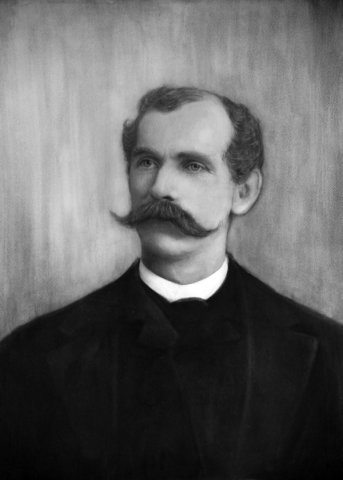Description:
This essay first appeared as an article in the library's Info magazine in July, 2009.

Now that my life is half over, I see enough in the rearview mirror to realize that pretty much any situation you encounter in life has already been covered by an Old Testament story or a Shakespeare play – or both. Most of our collective knowledge of these stories has been further condensed into utility one-liners like “pride cometh before a fall” and “all’s well that ends well.” As a historian, though, I love to play the “What if...” game. And one of the “what if’s” I’ve often wondered about is what would have happened if Moses had crossed on over into the Promised Land even though he was told it was forbidden. He had already disobeyed once and he was already destined to climb up to Pisgah and be struck down, so what did he have to lose?
You’re wondering what Moses has to do with this guy, Oklahoma City’s first mayor, William L. Couch. Well, Couch was a Moses of sorts. Around 1884, he joined David L. Payne’s Oklahoma Colony and soon after distinguished himself enough to become Payne’s lieutenant and eventual heir to leadership of the Boomer movement to settle the Unassigned Lands. After working tirelessly to open the land to white settlement, involving repeated arrests and lengthy testimonies before government officials, Couch and the Boomers had finally convinced Washington to allow it in early 1889. However, President Harrison warned that anyone present before the official opening was prohibited from making a claim in the Promised Land.
Couch had secured himself a job with the Santa Fe Railroad just before the opening and he thus had ample opportunity to scout out the best land for a claim. Despite being expressly forbidden from entering into the Promised Land, Couch strolled over to present day Main and Walker just after noon on April 22nd, and staked a claim to his new farm long before the first legitimate land runners arrived. A handful of others claimed his land as well, but as there was no authority at the time, claims disputes were not being settled just yet.
About a week after the run, a provisional government was set up and Couch was elected Oklahoma City’s first mayor. He was the natural choice, as he was well known by the Boomers and known to be in possession of fine leadership skills. But contemporaries also said he was uncompromising, easily angered, and quick to combat. One of the other claimants for the homestead was J. C. Adams, described as violent and eccentric to the point of madness. You can see where this is going. Couch resigned the mayoralty in spring of 1890 to defend his claim and soon after he was wounded in a skirmish with Adams. He died of complications on April 21 – a full year after entering the Promised Land. Like Moses, he passed from the Earth even though “his eye was not dim, nor his natural force abated.”
All in all, I’d say it’s a pretty good answer to the “what if.” If the lawgivers themselves aren’t held accountable for upholding the law, then what hope is there for a nation guided by the rule of law?